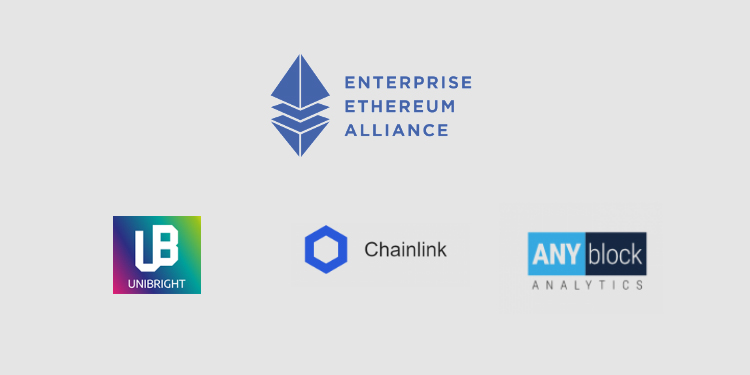The Enterprise Ethereum Alliance (EEA), a member-led industry organization whose objective is to drive the use of Ethereum blockchain technology, has announced that a new mainnet working group has formed named EMINENT (Ethereum Mainnet Integration for Enterprises).
Designated as a key Task Force, the new working group is focused on the standards and specifications used to integrate the Ethereum Mainnet with ERP, CRM, and other corporate systems of record.
Chainlink is an oracle provider for inputs and outputs of smart contracts; Unibright provides blockchain-based business integration, and Anyblock Analytics as a provider of blockchain data analytics and tools. The three have joined forces to accelerate and scale the adoption of Ethereum in businesses.
“In current client projects, we all see a lot of individual development due to the lack of standards. Our goal is to make life easier for enterprises and technology providers, to help building standards and to be able to focus on the special 20% of an individual use-case, rather than re-inventing wheels all the time. The setup of this Task Force is very powerful and we are happy to be a leading part of it.”
– Stefan Schmidt, Unibright Co-Founder and CTO
Background
Rearranging existing architectures around centralized ERP-systems towards decentralization implicates new ideas about how systems interact, what kind of (internal) states can or should be recorded in a publicly available distributed ledger, how external information is included, and how the growing amount of data can be handled and analyzed. Challenges involve concepts on computation, storage and messaging which bridge the gap between entirely centralized systems and pure smart contract implementations.
“Getting the Mainnet working as an always-on enterprise service bus is a powerful idea that security-minded CISOs can get behind. Imagine a world where you don’t need to expend massive capital to support every new partner integration. To make this work, we need experts laying down the standards for common-sense integration with enterprise systems of record. Unibright has experience connecting blockchain to ERP. Chainlink has the experience of keeping different databases, run by different companies, in a state of consistency. That’s a promising combination.”
– John Wolpert, MWG vice-chair and convener
Focus of the Task Force’s is to build open source available reference implementations and guidelines for mainnet integration with enterprise “systems of record”. Every software that serves as the backbone for a particular business process can be seen as a “system of record”: an information storage and retrieval system serving as an authoritative source of truth, like ERP (Enterprise Resource Planning) and CRM (Customer Relationship Management) systems, and systems supporting processes in Financials, Controlling, Material Management, Sales and Distribution or Human Resources.
The Task Force is set up to work for 18-24 months. Initially, the task schedule will focus on defining work packages, then expand into building best practice solutions within proof-of-concept implementations, and finally provide open-source available documentation and specification basis (like ERC standards) for further development by the public Ethereum community and EEA members. Intermediate results will be presented to the public while the Task Force is active.
“We’re excited to work closely with the EMINENT Task Force to continually push the boundaries of what’s possible in public blockchain environments. Developing mainnet integration standards that take into account the specific challenges of enterprises is key to the EMINENT Task Force being able to leverage the unique advantages of public blockchains, while seamlessly and securely incorporating their current systems of record and key data sources.”
– Sergey Nazarov, Co-Founder of Chainlink
Potential exists for synergies and points of contact with other EEA working groups, such as the Enterprise Use Case and Requirements Task Force (for both understanding mainnet integration as a potential use case and finding use-cases for reference implementations), the Cross-Chain Interoperability Task Force (when considering cross-chain integration with enterprise systems of record) and the Technical Specification Working Group (when it comes to extracting standards of the concepts developed).
“We are very happy to work with our already existing partners Unibright and Chainlink on solutions specifically for enterprise use cases. While our tech stack also works with permissioned blockchains, we see great potential for interoperability and innovation if corporates are building on the public Ethereum Mainnet as well.”
– Freddy Zwanzger, Anyblock Analytics Co-Founder and CDO






















